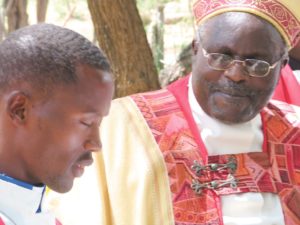
The World Mission Prayer League has been at work in Africa since 1968, as you will read in this month’s newsletter. We were centuries late to the scene.
The gospel has been at work in Africa since New Testament times (cf. Acts 8:26ff.). In the first few centuries of our era, Africa produced “some of the keenest intellects and most influential apologists in Christendom.”[1] Origen was an African, as were Augustine and Tertullian. The African church still produces world-class apologists. I have met a few.
Over the last one hundred years, the African church has grown at unprecedented speed. In 1900 fewer than 10 million Christians were found in Africa; today the number approaches 500 million. In 1900 African Christians accounted for less than 2% of the world’s Christians; today nearly one out of four of our entire Christian family is an African sister or brother. And the church is growing by approximately 23,000 sisters and brothers every day.
Some while ago, I shared a plate of ugali with a Christian brother in Maralal, in the heart of the Samburu District of northern Kenya. The brother served as chairman of the Samburu New Testament Translation Project – a project that we have been involved in for several years. He is an Anglican priest, a Samburu man himself, and pastors an Anglican parish in Maralal.
After ugali, while sipping coffee, I leaned across the table. I wanted to thank this good brother – and the entire Anglican community in Kenya, if I could – for their leadership in the worldwide Anglican Communion. They have stood for the Bible. They have advocated faith. They have led – as the African church in Origen’s day might lead – when much of the Communion, especially in western lands, seems spiritually adrift.
In a gesture that I will not soon forget, he leaned over the table himself, put his hand upon my arm and said, “You are not alone….” “Remember,” he said, “we are praying for you here in Samburuland. The sisters and brothers in the west are not alone.”
I have been reading a book by Mark Noll titled, “The New Shape of World Christianity.” The book describes “changes of stunning proportions” resulting in “a series of mind-blowing realities.”
“This past Sunday,” the author reports, “more Anglicans attended church in each of Kenya, South Africa, Tanzania and Uganda than did Anglicans in Britain and Canada and Episcopalians in the United States combined – and the number of Anglicans in church in Nigeria was several times the number of those other African countries.”[2]
You find similar stunning realities in our Lutheran family of churches, as well. Two of the three largest Lutheran churches in the world are African Lutheran churches. The Ethiopian Evangelical Church Mekane Yesu numbers approximately 6 million members. The Evangelical Lutheran Church in Tanzania numbers almost the same. (The largest of all is the Church of Sweden; yet if we were counting active, faith-filled Lutherans – the kind that go to church from time to time, let’s say – the churches of Scandinavia would appear somewhat lower on the list.)
A few months ago I had the pleasure of spending a day with the General Secretary of the Mekane Yesu church, in Addis Ababa. He reported that the church had grown by 300,000 members in 2010. But the Lutheran churches of North America report a decrease in membership by approximately the same amount.[3]
Changes such as these represent a shift in the very narrative of Christianity. Noll declares: “The time has come for a new history of Christianity.”[4]
This is a history that is larger than we are used to. We sent Carlsen and Weinhardt to Bolivia 75 years ago and our first missionaries to Africa more than 40 years ago. But there were Christians in Africa since the days of Philip the Apostle.
This is a history broader than we are accustomed to. American Christians are fewer than 10% of the world total today. Yet Christians around the world are a wonderfully dynamic and steadily growing community.
This is a history that is more hopeful than we sometimes feel ourselves. For the first time in human history, the church of Jesus Christ is a truly global fellowship. This makes our collective calling – to make disciples of all nations (Matthew 28:18-20) – more doable than ever before.
This is a history that is going somewhere. It is a powerful, gospel-fueled, world-changing movement – deep, broad, missionary, hopeful. And the God who stands behind it invites us to come along.
[2] Mark Noll, The New Shape of World Christianity. Downers Grove: IVP Academic, 2009. pp.20-21.
[3] http://www.lutheranworld.org/lwf/index.php/member-statistics-2011.html
[4] Noll, p.23